As the fall 2024 college semester begins, let us not forget how the spring 2024 semester ended. To refresh your memory, protests about the war in Gaza convulsed campuses across the country. There was cancellation of in-person classes, cancellation of graduation exercises, complaints of anti-Semitism, complaints of Islamophobia, faculty rage, sporadic violence, police intervention, cantankerous exchanges with elected officials, and gunplay. And that was just at Columbia University.
Equally dismaying was the aggressive intervention into college affairs by the House Committee on Education and the Workforce. Led by Rep. Virginia Foxx, the Republican-controlled body dragooned college leaders to Washington, DC. The presidents, some fresh from coaching sessions of dubious efficacy, were seated in the Rayburn House Office Building, outfitted with dunce caps and then humiliated by irate GOP representatives. The latter’s concerns about campus anti-Semitism were legitimate, if somewhat selective given the spread of anti-Semitism on the right.
If last spring taught us anything, it is that the current status quo is unsustainable. Colleges cannot function with the federal government deposing (in both senses of the term) their leadership. Protesters cannot effectively shut down their own schools. A university, with all of its vast and magisterial intellectual resources, cannot be reduced to a space of slogans, flags, binaries, and brawls.
Unless college presidents crave more encounters with Virginia Foxx et al., they will need to aggressively regulate campus speech about the Israeli-Palestinian conflict. What follows is some unsolicited advice for thinking about some tricky free speech dilemmas, as well as a plea for serious introspection.
